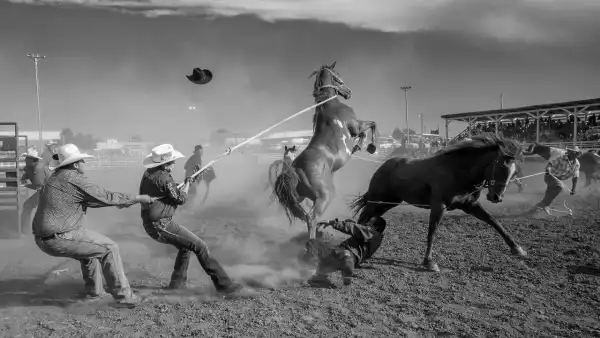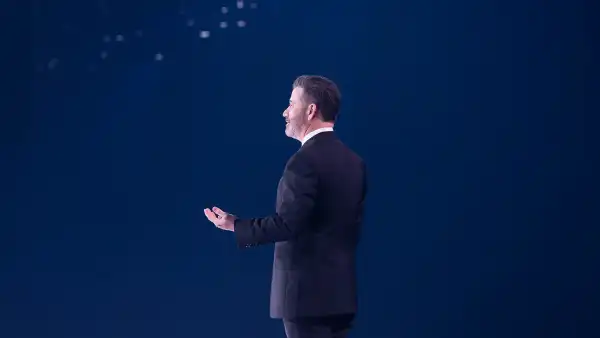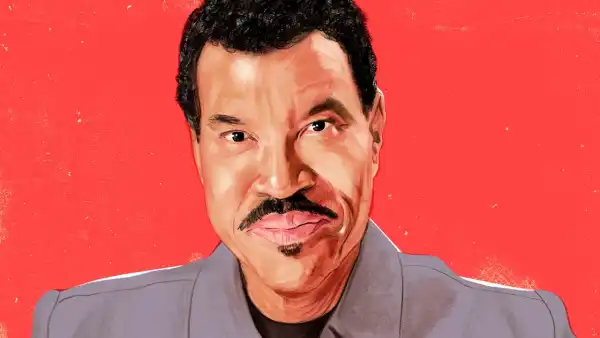
“Yesterday was Halloween. Tomorrow’s the New York City Marathon.” That’s how the “Saturday Night Live” host Chris Rock, clad in black, framed the week’s concerns, as he paced the stage of Studio 8H around midnight on November 1, 2014, before launching into controversial material about the Boston Marathon bombing, the previous year, and the inauspicious opening of the Freedom Tower, the following week. He spread his arms with the air of someone trying to calm an audience, as if everything was about to get out of hand. That same episode addressed the Ebola crisis, Hurricane Sandy, and Chris Christie’s 2016 Presidential prospects. “Is America ready for, like, a likeable Kevin James type?” Bobby Moynihan, playing Christie in a skit, asked, referring to the star of the outer-borough sitcom “King of Queens,” as he shrugged like a Soprano in his pin-striped suit. “An affable jamoke from the old neighborhood?”
Notably absent from the patter at the top of the broadcast, at least from the perspective of our relentlessly political present, was any mention of the midterm elections that Tuesday. The audience was perfunctorily clued in, about halfway through the episode, in the introduction of a sketch about black voters’ loyalty to Obama, and again, by Michael Che, at the “Weekend Update” desk. “I know a lot of people aren’t going to vote because they don’t follow politics, but that’s no excuse. I don’t know anything about politics, but last year I voted for Mayor Bill de Blasio, because I liked his son’s afro, and it counted, just as much as a smart person’s,” Che said. “So make sure you get out there and vote next Tuesday. Or this Tuesday. Whatever. Who cares, man? It’s the midterms. It’s not even important.” The line summed up what a lot of Americans probably felt. After the election, the Democrats lost control of the Senate for the first time since 2006.
Four years later, on the other side of 2016, after a jamoke from Queens did take the White House, and raised the political temperature of the country; a week and a half after a man in a van sent bombs to about a dozen major political figures; a week after another man shot up a synagogue in Pittsburgh; and a couple days after another shot up a hot-yoga studio in Tallahassee—it’s hard to know what to feel, or what a comedy show like “Saturday Night Live,” one that often helps clarify the country’s perspective on difficult events, should do. Meanwhile, the President who helped stoke the violent cloud that hangs over the country provides seemingly endless comedic fodder that can feel, at times, too sad to touch. Like Voltaire’s Candide, beset by tragedy on all sides, we find it hard to see that this is the best of all possible worlds, and—even harder to determine—what is the best of all possible jokes.

Further Reading
New Yorker writers on the 2018 midterm elections.
These days, “S.N.L.” ’s sketches are studied with Talmudic exhaustiveness by outlets large and small. Some critics will chide the show’s writers for being too one-sided politically, others for being not pointedly political enough. The scope of the recap, a now ubiquitous journalistic form that surrounds every hotly discussed television show, has been enlarged by the appearance of the “precap,” which suggests what might be noteworthy in an episode that hasn’t yet aired. The Web site TVLine predicted that this season’s pre-midterms episode, with Jonah Hill hosting, might have Robert De Niro reprise his role as the special counsel Robert Mueller, in light of recent sexual-misconduct allegations against the former F.B.I. director that were quickly revealed to be a hoax, or that there might be an appearance by the “S.N.L.” alum Will Ferrell—who, along with Oprah, has been knocking on doors for the gubernatorial candidate Stacey Abrams in Georgia—on “Weekend Update.”
The oracles at TVLine, however, couldn’t see clearly into their crystal ball. On Friday, Alec Baldwin—a frequent “Saturday Night Live” host and an even more frequent celebrity guest, who plays the show’s caricature of Donald Trump—was arrested for allegedly assaulting a man who is reported to be a survivor of the Boston Marathon bombing. The use, or overuse, of Baldwin has been much lamented by “S.N.L.” stalwarts, who claim that his Trump seems merely to parrot, with no discernible point, the absurd falsehoods and braggadocio of the commander-in-chief. This is not always true; sketches of Baldwin playing Trump as a befuddled child under the thumb of Steve Bannon—represented as Death, in a skull mask and black robe—seem to have contributed to the adviser’s ouster, last summer. Still, it was a joy and a relief to see the “S.N.L.” luminary Kate McKinnon star in the cold open, with a blonde coif and red dress, in the role of the conservative talk-show host Laura Ingraham.
In doing so, McKinnon and the “S.N.L.” writers provided viewers with something worn but comforting: a sendup of Fox News. “Just to quickly respond to all of my fan mail: ‘No, you’re an A-hole,’ ” McKinnon began, her arm braced against the desk in front of her. The specific target of the sketch was the Administration’s fear-mongering over a group of Latin American refugees moving slowly through Mexico. “Tonight we’re live from the Arizona border,” McKinnon continued, “where a vicious caravan of dozens—maybe millions—of illegal immigrants is headed straight for you and your grandchildren.” Throughout the segment, Cecily Strong, playing the Fox News personality Jeanine Pirro, and Kenan Thompson, as the former Milwaukee sheriff David Clarke, joined McKinnon’s Ingraham and, in a parody of Fox’s predilection for using erroneous clips, cued what they described as footage of the migrant caravan: a crowd of Black Friday shoppers tearing at boxes, a scene of Brad Pitt running from a virus-infected horde in the apocalyptic horror film “World War Z,” and crabs sidling across the sand on a beach. “The situation is urgent, Laura,” Thompson said, arching an eyebrow beneath a black cowboy hat. “The caravan is only eight hundred miles from our border. If these immigrants walk at a normal pace of three hundred miles a day, they could be here in time to vote on Election Day.”
From that point on, political urgency, neurosis, and fatigue became the leitmotif of the episode. NBC’s New York station loaded the hour leading up to the broadcast with campaign ad after campaign ad. In apparent response, a perfectly tuned, pre-taped parody of “blue wave” Democratic messaging, in which liberal voters trembled with uneasy optimism about retaking the House, included an oblique reference to the recent violence—Heidi Gardner, as a graying suburban mother, stands on her lawn and shouts at her kids to stay inside until after the election—and ended with McKinnon as a twitchy flower-store owner screaming until her shop windows shattered. In another pre-recorded segment, Aidy Bryant played Sarah Huckabee Sanders as a spokeswoman for a sleep aid geared to her specific guilty conscience. Taking one pill causes her to collapse immediately, breaking tables and chairs on her way to the floor. Another beautifully absurd sketch starred McKinnon as a high-school teacher who has fallen to the ground, and either can’t or won’t get up, but still wants to give her students insight into the human condition. This sketch seemed to capture the nation’s general mood best. “Maybe you’re laughing because you’re afraid,” McKinnon says, when her students—played by Hill, Bryant, and Pete Davidson, who were hardly laughing—express concern. “Teacher’s on the ground. Everything’s different. Are we O.K.?”
Certainly, things are different on this side of 2016, but “Saturday Night Live” has a long history of dealing with America’s low points. Sometimes tragedy, trauma, and terror require a more tender response. But, at other moments, “S.N.L.” has been the venue where American confusion and pain are expressed best. In 1978, the first year that the show’s writers and comedians could make hay of a midterm election, Dan Aykroyd, in the cold open, played an implacable Jimmy Carter who knew he was about to face some bad results. Later, at the “Weekend Update” desk, as Jane Curtin looked on in mock horror, an increasingly belligerent John Belushi ranted about the importance of that Tuesday’s midterms until he fell from his chair. He talked about voting as a sacred right, brought up the victims of the country’s war on drugs (“There’s still some people in prison in Texas eating rats, because they were caught with a seed!”), and described berating a friend who didn’t vote. “In Amsterdam, everybody votes there,” he said, growing angrier as he pointed his finger at the camera. “And they smoke hash in the streets. So don’t tell me it doesn’t make a difference!”
Four decades later, Michael Che, after expressing some resignation, mainly for laughs, changed his tune from 2014 and made a similar appeal. As the camera pulled away at the end of the segment and the audience cheered, he thrust his hands forward in a gesture of encouragement. “Vote!,” he shouted. “Vote, vote, vote!”
Sourse: newyorker.com






